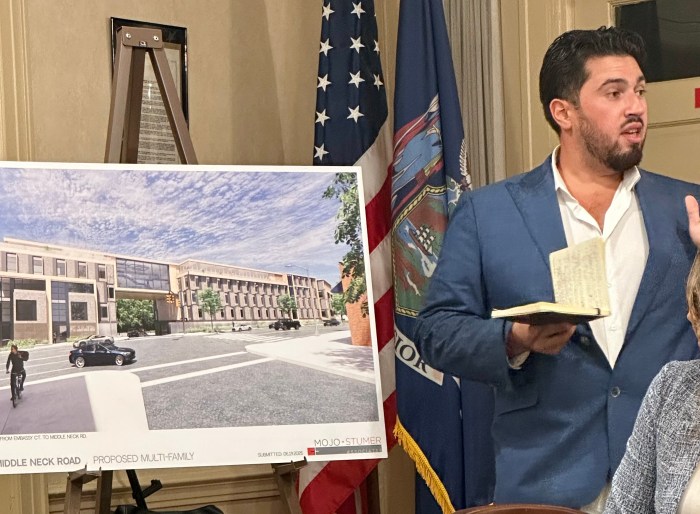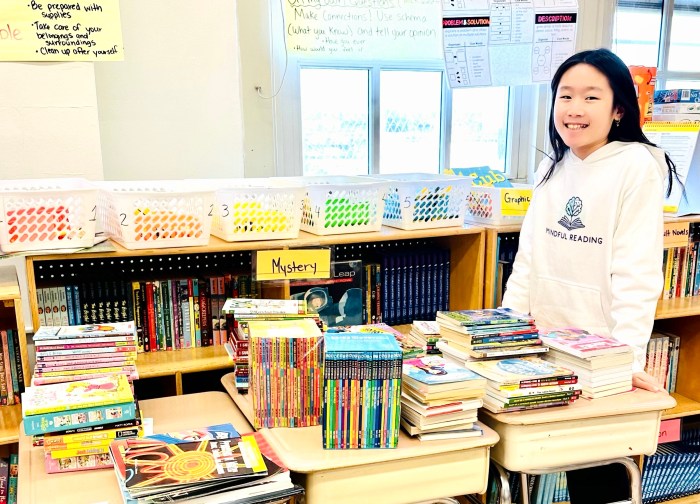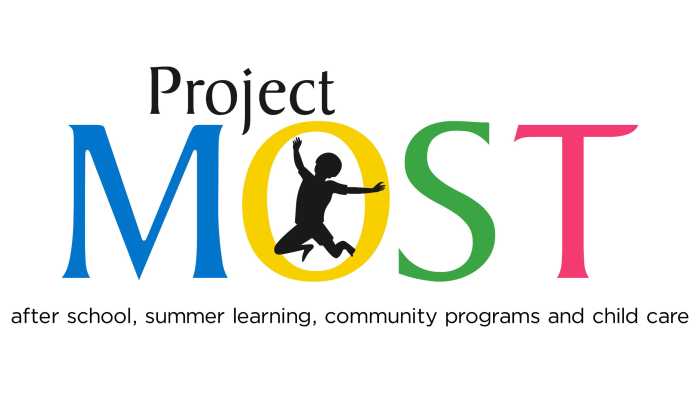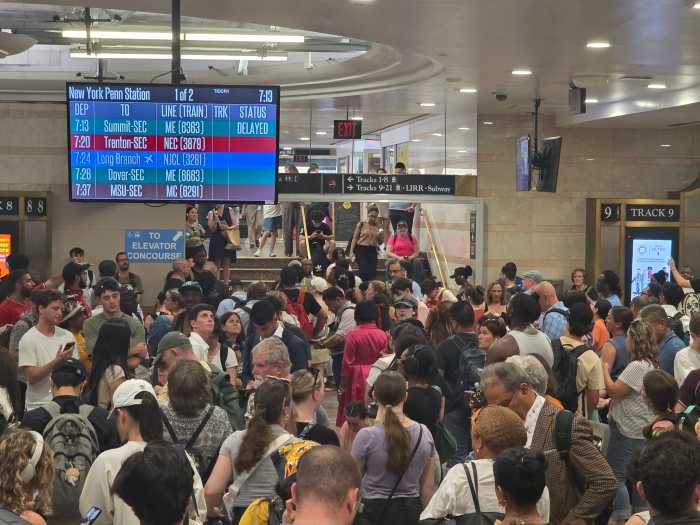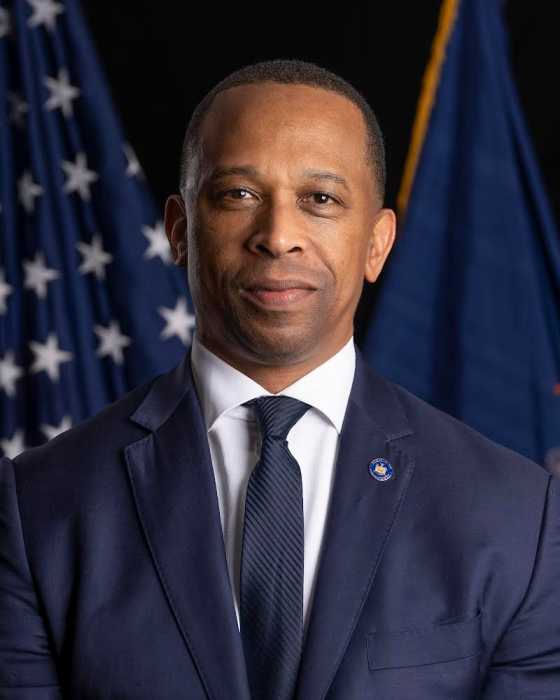
More than 150 yoga lovers joined together at the beautiful water’s edge of Sands Point Preserve on Saturday, Sept. 9, for One Love Long Island 2017, a daylong music and yoga festival. More than 20 yoga studio communities from across Long Island united with common breath, compassion and the practice of yoga to raise awareness and funds in support of organizations that work to eradicate the horrific practice of human trafficking.
In addition to a plethora of yoga sessions, the day’s events included drum circles, dancing, Hula-Hoops, hugs and laughter. Vendors displayed crystals, essential oils, jewelry, clothing and Hippea healthy snacks. According to the organizers, the goal of the event, which is currently in its fifth year, is to provide refuge, rehabilitation and economic opportunities to survivors of trafficking globally. Partners in the event use yoga to inspire conscious sustainable activism and ignite grassroots social change.

Nadine Wolff, one of the founders of One Love Long Island and a tireless advocate for victims of trafficking, is also on the board of Puresa Humanitarian, a nonprofit organization founded by former top model Giselle Meza, who survived being trafficked as a 14 year old in Costa Rica. Meza’s mission is to help rescue and restore innocent children and women from around the world who have been exploited and enslaved.
“I am humbled and honored for the opportunity to have been invited onto the board of Puresa Humanitarian,” said Wolff. “No human being should ever be for sale, and I will continue to raise funds and awareness around this insidious crime against humanity in an authentic and meaningful way. I will work tirelessly to be a voice for those whose basic rights have been denied to them and do whatever it may take to help empower these innocent victims, so they may live out the rest of their lives with dignity and respect.”
Restoring Hope for Victims of Abuse

Trafficking occurs across all communities regardless of race, gender identity or economic status. Human trafficking falls into two major categories: labor trafficking and sex trafficking.
The vast majority of sex-trafficking victims are teenage runaways and/or victims of childhood sexual assault. Since they have nowhere to turn, they are easily seduced or lured into the hands of a helpful stranger. Victims are males and females from all socioeconomic levels of society. Once they are in the clutches of a pimp or trafficker, the friendship or courtship turns into a controlling and abusive relationship, and the pimp orders the victim to provide sex to customers. The victims are traumatized by sleep and food deprivation, physical assaults, STDs, forced abortions and psychological torture.

Police departments do not have sufficient resources to combat the hundreds of cases of trafficking that take place on Long Island each year. In Nassau County alone, The Safe Center, a victims’ services organization located in Bethpage, which has been at the forefront of assisting victims of sexual assault in Great Neck and throughout Nassau County, had more than 150 cases of trafficking in 2016.
Labor and sex trafficking also occurs in massage parlors, nail salons, farms and restaurants. As with guns and drugs, there is a huge demand for prostitutes and, as a result, a huge supply.
Due to the stigma of prostitution, victims who are trafficked have nowhere to turn to for help. They may be undocumented, so they fear the government and the police. They feel shame, as if they have dishonored their family. Many of the victims are from Korea, China and Eastern Europe. They also might not know the language or have any way of asking for help. Many have debt bondage from which they can never escape.

Helping victims obtain life-saving resources and mental-health counseling enables the majority to move forward with healthy new lives. It is important to treat victims as worthy individuals, and not as bad or damaged people. The abuse is never the victim’s fault.
Drug Awareness
The One Love event also focused on the efforts of the Long Island Council on Alcoholism and Drug Dependence (LICADD) to help raise awareness and make a difference for those suffering from the current drug epidemic on Long Island.

The growing crisis of opioid addiction and saving lives from drug overdose is also being addressed by the Great Neck Public Schools UPTC, along with many concerned partners. The school district will be sponsoring Not My Child at the Great Neck Main Library on Nov. 1 at 7:30 p.m. The moderator of the event will be North Shore Action, which is also a sponsor.
The expert panel will include Cathy Samuels from CASA Manhasset, Maria Cuadra of COPAY in Great Neck, Detective Pamela Stark of the Nassau County Police Task Force on Opioids and Zachary Goldfarb, EMT and sergeant of arms of the Vigilant Fire Company. LICADD, an affiliate of the Family and Children’s Association, which has offices at 1025 Old Country Rd. in Westbury, will also be on hand to sign up volunteers for life-saving Narcan training.
To find out more information about the Nov. 1 event, email northshoreaction@gmail.com.

Jacqueline Harounian volunteered at the One Love event, along with Elizabeth Osowiecki of The Safe Center, to help build awareness about trafficking. For more than 30 years, the organization was led by Executive Director Sandy Oliva, who is retiring after three decades of dedicated service. Her myriad accomplishments are being celebrated on Oct. 19 at The Safe Center gala at the Garden City Hotel; visit www.tscli.org for more information or to purchase tickets.
As the Not My Child event approaches on Nov. 1, look for Harounian’s three-part series regarding the community’s response to the opioid epidemic in upcoming issues of the Great Neck Record.





